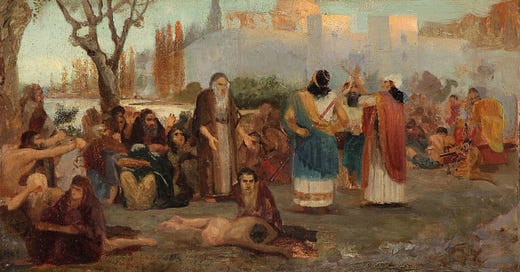Reflections on Ecclesiastes, part 1: Qohelet's "Middle Way"
The first of a short series on a very strange book
There are three books in the Hebrew Scriptures that, in tone and content, should strike us as odd additions to the Jewish canon. One of these is a collection of erotic poetry attributed to Solomon (The Song of Songs), included because it could be interpreted as a mystical text celebrating the love between God and his people (and, by extension, the individual). The book of Job is another unusual inclusion, for quite different reasons. It dares to call into question the goodness and reasonableness of God himself. Its framework is an old tale of conventional piety (Job is tested, Job maintains his loyalty to Yahweh, Job is rewarded), but its dialogues and arguments – apparently added at a later date – disturb and undermine this neat convention. That either the Song of Songs or the book of Job made the final cut is a testimony to the religious and intellectual breadth of the ancient rabbis. But it’s the third of these three strange books that I will be reflecting on in this and the next few posts. The book of Ecclesiastes (or Qohelet, to use its original Hebrew name) is the work of a curmudgeon, an old man (we must assume), and a sage. At first blush, it’s a work that may seem to be antithetical to any notion of the “mystical.” I will, of course, be arguing the opposite. A pessimist Qohelet may seem to us to be at times, a sort of ancient Schopenhauer, but as we will also see, he is a person who has experienced life and has come to know firsthand what I call the grace of disillusionment. Disillusionment, as I’ve mentioned elsewhere, is an inescapable part of the inner life.
Keep reading with a 7-day free trial
Subscribe to The Pragmatic Mystic to keep reading this post and get 7 days of free access to the full post archives.



